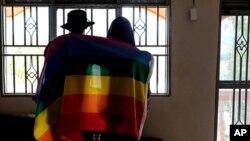U.S. Secretary of State Antony Blinken has ordered his agency to update its travel guidance to Uganda in the wake of the east African nation’s approval of a draconian new anti-homosexual law.
In a statement released late Monday, Blinken said he has also ordered State Department officials to consider using existing restrictions tools against Ugandan officials and other individuals “for abuse of universal human rights, including the human rights of LGBTQI+ persons.”
The top U.S. diplomat says Uganda’s “failure to safeguard the human rights of LGBTQI+ persons is part of a broader degradation of human rights protections that puts Ugandan citizens at risk and damages the country’s reputation as a destination for investment, development, tourism, and refugees.”
Members of Uganda’s LGBTQ community were in shock following the enactment of the Anti-Homosexuality Act, signed into law Monday by President Yoweri Museveni. They called for its repeal and filed a notice Monday with the country’s attorney general about their intention to bring the matter to court.
Critics say the law, which allows life imprisonment and the death penalty in some cases, is draconian and the world’s harshest.
The new law clarifies that identifying as gay would not be criminalized but says that “engaging in acts of homosexuality” is punishable with life imprisonment.
The law also imposes the death penalty for what it calls “aggravated homosexuality.” This includes sexual relations involving people infected with HIV, as well as sex with people categorized as vulnerable, including minors and the elderly.
Any Ugandan who does not report such cases is liable on conviction to spend five years in prison or pay a fine of 10 million Ugandan shillings, about $2,680.
In addition, the law says journalists and other media figures face five years in prison if they disclose the identity of a victim of a homosexual act without the authority of the court or that person.
U.S. President Joe Biden has condemned Uganda's new anti-gay law, calling it “shameful” and a “tragic violation of universal human rights.”
In a statement Monday, Biden said the law is “the latest development in an alarming trend of human rights abuses and corruption in Uganda.”
Eric Ndawula, executive director of the Lifeline Youth Empowerment Center, an NGO in Kampala that provides support to Ugandans who are gay, bisexual or queer, told VOA that the LGBTQ community is frightened over what will come next.
“I am very scared, honestly,” he said. “It was expected, but it came very abrupt this morning to just wake up to such news. We are still working together as a... convening for equality to see our next step forward. But the news has just shocked us.”
EU foreign policy chief Josep Borrell said Monday the measure is “contrary to international human rights law” and will affect Uganda’s ties with international partners.
“The Ugandan government has an obligation to protect all of its citizens and uphold their basic rights. Failure to do so will undermine relationships with international partners,” he said.
Canada’s Foreign Minister Melanie Joly called the law “abhorrent, cruel and unjust,” while the British government said it was “appalled” by the measure, according to Andrew Mitchell, Britain’s minister of state for development and Africa.
In April, Uganda’s parliament passed the Anti-Homosexuality Act on a vote of 341 to 1.
In a statement Monday, parliament speaker Anita Among said lawmakers heeded the concerns of Ugandans and legislated to protect the sanctity of the family.
Among urged authorities to enforce the law in what she called a fair, steadfast and firm manner.
In his statement Monday, Biden said that since the law was first introduced, reports of violence and discrimination against Ugandans who are perceived to be from the LGBTQ community have been rising.
“Innocent Ugandans now fear going to hospitals, clinics, or other establishments to receive life-saving medical care lest they be targeted by hateful reprisals. Some have been evicted from their homes or fired from their jobs,” Biden said.
Amnesty International has described the law as draconian and says it hopes that Ugandan rights groups will advocate for its repeal.
“We hope that we will continue working with rights groups to push or challenge, especially parliamentarians, to repeal this abhorrent law,” Roland Ebole, Amnesty International regional researcher, told VOA. “I know the second option is very unlikely considering that this was passed by a very large majority, so perhaps our hope right now is the court. That the court will actually look at this law and see that it is a violation of human rights.”
International bodies that operate in Uganda, such as UNAIDS and USAID, have previously stated that the passage of the Anti-Homosexuality Act will not only complicate their work there, but reverse the gains made by the country in the fight against HIV/AIDS.












